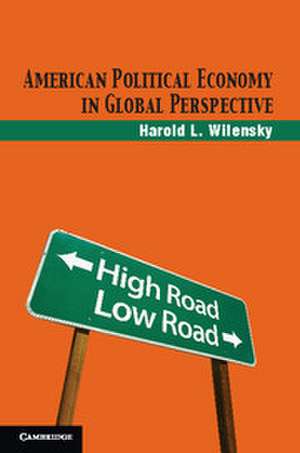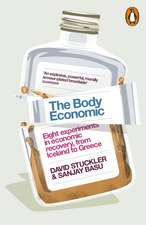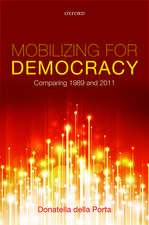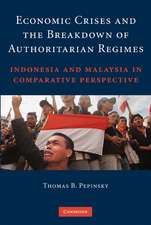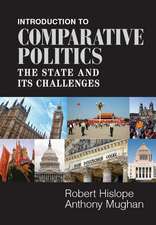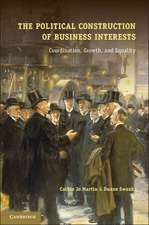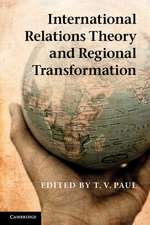American Political Economy in Global Perspective
Autor Harold L. Wilenskyen Limba Engleză Hardback – 28 feb 2012
| Toate formatele și edițiile | Preț | Express |
|---|---|---|
| Paperback (1) | 285.41 lei 6-8 săpt. | |
| Cambridge University Press – 28 feb 2012 | 285.41 lei 6-8 săpt. | |
| Hardback (1) | 743.81 lei 6-8 săpt. | |
| Cambridge University Press – 28 feb 2012 | 743.81 lei 6-8 săpt. |
Preț: 743.81 lei
Preț vechi: 864.90 lei
-14% Nou
Puncte Express: 1116
Preț estimativ în valută:
142.35€ • 148.22$ • 120.30£
142.35€ • 148.22$ • 120.30£
Carte tipărită la comandă
Livrare economică 07-21 martie
Preluare comenzi: 021 569.72.76
Specificații
ISBN-13: 9781107018099
ISBN-10: 1107018099
Pagini: 384
Ilustrații: 6 b/w illus. 11 tables
Dimensiuni: 161 x 241 x 24 mm
Greutate: 0.75 kg
Ediția:New.
Editura: Cambridge University Press
Colecția Cambridge University Press
Locul publicării:New York, United States
ISBN-10: 1107018099
Pagini: 384
Ilustrații: 6 b/w illus. 11 tables
Dimensiuni: 161 x 241 x 24 mm
Greutate: 0.75 kg
Ediția:New.
Editura: Cambridge University Press
Colecția Cambridge University Press
Locul publicării:New York, United States
Cuprins
Part I. Globalization, Public Policy, and the Wellbeing of People: 1. The welfare state as the center of public finance and political conflict; 2. Energy policy and performance: US and the world; 3. What tradeoffs are good and bad for the economy?: domestic structures and policies that permit adaptation to globalization; 4. Retrenchment of the welfare state?: the fate of 'cutback budgeting' in Italy, France, Germany, the US, UK and New Zealand; 5. Pensions coverage: US health care remains unique; 6. The impact of 'globalization': an overview; Part II. Moving the US. off the Low Road: Lessons from Abroad: 7. Low road versus high road: American exceptionalism; 8. Policy implications for the United States: how to get off the low road.
Recenzii
“Professor Wilensky has produced the ultimate study of globalization’s impact on nation-states, an urgent must-read guide for students, policy experts and public officeholders alike. Using comparative analysis, he shreds the notion that creating a healthy economy or citizenry requires that government shrink itself into oblivion; indeed, quite the opposite. The most successful countries with the highest quality-of-life, the most robust economies and healthiest democracies are ones that have an efficient-but-active government armed with smart economic and social policies. The wisdom and prescriptions in American Political Economy in Global Perspective ought to be required reading for every single member of Congress today." —Jennifer M. Granholm, former Governor (D, Michigan)
“This is a remarkable, comprehensive, prodigious and insightful piece of scholarship that analyses the wrong headed economic and policy choices that have contributed so pervasively to the eroding standard of living inflicted on the American middle class. It makes clear there are other paths that can lead to a greater chance for broadly shared prosperity and national recovery than the simplistic, one dimensional, and zealously ideological dogma aimed at keeping government so weak it has little chance to make markets work for the broader society." —David R. Obey, former Member of Congress (D, Wisconsin)
“This book illuminates the most important policy disputes that mark American—and Western European—politics. It is remarkable as a careful, detailed, and clearly written synthesis of arguments and evidence. It will be a perfect foil for scholars and practitioners who strongly agree or disagree with Wilensky’s conclusions about the impact of politics and public policies focused on the welfare state, jobs, equality, labor standards. energy, and public finance. A powerful contribution.” —Ted Marmor, Yale University
“Once again Harold Wilensky proves to be one of the grand masters of comparative social research. Based on a great wealth of data showing what rich democracies have in common and where they differ, he not only dismantles the myth of American exceptionalism, but also draws a number of specific policy conclusions which are of relevance for U.S. elections: Far from being a ‘Ponzi scheme,’ social security is a most effective tool of poverty prevention, a universal health insurance program is the best way to ensure access to health care services as well as effective cost containment, and industrial relations that integrate workers and unions into economic decision-making enhance not only social cohesion, but also productivity and growth.” —Jens Alber, Social Science Research Center Berlin
“Hal’s last book will not restore US political debates to sanity. No single book can do that. But it makes a heroic effort to re-introduce level-headed, empirically informed pragmatism in a country that to a worried outsider seems bent on self-destruction as a great power. Small nations like mine officially advocate multilateralism, since multilateralism ties the strong and the weak together in a web of mutual agreements, where the strong have to listen to the weak. But many of us who were foreign colleagues of Hal are more-or-less secretly of the opinion that multilateralism works best if one major power, provided it is a sane and civilized one, carries a larger stick than the rest. I hope Hal’s last book will help cool ideological disputes down and widen the room for informed, pragmatic argument in US policy-level political discourse. Hal would have liked that, as his final gift to the rest of us.”—Einar Øverbye, Oslo University College
“The United States must get beyond polarization of the left and right, and nobody is better equipped to tell us how to do it than Hal Wilensky with his 40 years of in-depth research on 19 rich democracies. In this brilliant summation of his life's work, Wilensky shows that neither the left nor the right is correct: globalization is not the culprit and neo-liberalism is not the solution. Centrist, activist, market-enabling, and work-facilitating governmental policies make rich democracies richer, and by enacting them, the United States can get on the high road to greater employment, growth, and social welfare." —Henry E. Brady, University of California, Berkeley; Dean, Goldman School of Public Policy
“What is ground-breaking in this book is the detailed application of comparative policy analysis to a wide range of social and economic problems of the U.S. in a global economy. No treatment of the 'varieties of capitalism' presents data as rich and comprehensive as Wilensky offers nor provide the depth of understanding of the U.S. political economy and the possibilities for reform. His sections on education reform alone are worth the price of the book; they are superb, provocative, and timely. I would gladly use this book in graduate and upper-division undergraduate courses.” —Lowell Turner, Cornell University
“Wilensky offers a powerful message for the United States at a critical moment: we must get off the low road of under-investment in human and physical capital, low wages, and high inequality, and we can do it. He combines careful research with incisive analysis and clear policy prescriptions. And he builds on a remarkable breadth of evidence—extensive data from 19 countries over 60 years—that gives his conclusions considerable weight.” —Steve Vogel, University of California, Berkeley
“The late Hal Wilinsky was the dean of social scientists working on the political economy of the welfare state. The present volume is a powerful summary of that life's work and a practical road-map to reforming public policies for the 21st century. The focus here may be on the United States, but the implications are much broader." —Barry Eichengreen, University of California, Berkeley
"In this book finished shortly before his death, Wilensky argues that the US should increase the size and scope of its welfare system so it more closely resembles those of northern Europe, which he views as more civilized, equitable, and just than that of the US...This comparative study is a provocative addition to the literature. Summing Up: Recommended."- R.E. Schenk, emeritus, Saint Joseph's College, CHOICE Magazine
“This is a remarkable, comprehensive, prodigious and insightful piece of scholarship that analyses the wrong headed economic and policy choices that have contributed so pervasively to the eroding standard of living inflicted on the American middle class. It makes clear there are other paths that can lead to a greater chance for broadly shared prosperity and national recovery than the simplistic, one dimensional, and zealously ideological dogma aimed at keeping government so weak it has little chance to make markets work for the broader society." —David R. Obey, former Member of Congress (D, Wisconsin)
“This book illuminates the most important policy disputes that mark American—and Western European—politics. It is remarkable as a careful, detailed, and clearly written synthesis of arguments and evidence. It will be a perfect foil for scholars and practitioners who strongly agree or disagree with Wilensky’s conclusions about the impact of politics and public policies focused on the welfare state, jobs, equality, labor standards. energy, and public finance. A powerful contribution.” —Ted Marmor, Yale University
“Once again Harold Wilensky proves to be one of the grand masters of comparative social research. Based on a great wealth of data showing what rich democracies have in common and where they differ, he not only dismantles the myth of American exceptionalism, but also draws a number of specific policy conclusions which are of relevance for U.S. elections: Far from being a ‘Ponzi scheme,’ social security is a most effective tool of poverty prevention, a universal health insurance program is the best way to ensure access to health care services as well as effective cost containment, and industrial relations that integrate workers and unions into economic decision-making enhance not only social cohesion, but also productivity and growth.” —Jens Alber, Social Science Research Center Berlin
“Hal’s last book will not restore US political debates to sanity. No single book can do that. But it makes a heroic effort to re-introduce level-headed, empirically informed pragmatism in a country that to a worried outsider seems bent on self-destruction as a great power. Small nations like mine officially advocate multilateralism, since multilateralism ties the strong and the weak together in a web of mutual agreements, where the strong have to listen to the weak. But many of us who were foreign colleagues of Hal are more-or-less secretly of the opinion that multilateralism works best if one major power, provided it is a sane and civilized one, carries a larger stick than the rest. I hope Hal’s last book will help cool ideological disputes down and widen the room for informed, pragmatic argument in US policy-level political discourse. Hal would have liked that, as his final gift to the rest of us.”—Einar Øverbye, Oslo University College
“The United States must get beyond polarization of the left and right, and nobody is better equipped to tell us how to do it than Hal Wilensky with his 40 years of in-depth research on 19 rich democracies. In this brilliant summation of his life's work, Wilensky shows that neither the left nor the right is correct: globalization is not the culprit and neo-liberalism is not the solution. Centrist, activist, market-enabling, and work-facilitating governmental policies make rich democracies richer, and by enacting them, the United States can get on the high road to greater employment, growth, and social welfare." —Henry E. Brady, University of California, Berkeley; Dean, Goldman School of Public Policy
“What is ground-breaking in this book is the detailed application of comparative policy analysis to a wide range of social and economic problems of the U.S. in a global economy. No treatment of the 'varieties of capitalism' presents data as rich and comprehensive as Wilensky offers nor provide the depth of understanding of the U.S. political economy and the possibilities for reform. His sections on education reform alone are worth the price of the book; they are superb, provocative, and timely. I would gladly use this book in graduate and upper-division undergraduate courses.” —Lowell Turner, Cornell University
“Wilensky offers a powerful message for the United States at a critical moment: we must get off the low road of under-investment in human and physical capital, low wages, and high inequality, and we can do it. He combines careful research with incisive analysis and clear policy prescriptions. And he builds on a remarkable breadth of evidence—extensive data from 19 countries over 60 years—that gives his conclusions considerable weight.” —Steve Vogel, University of California, Berkeley
“The late Hal Wilinsky was the dean of social scientists working on the political economy of the welfare state. The present volume is a powerful summary of that life's work and a practical road-map to reforming public policies for the 21st century. The focus here may be on the United States, but the implications are much broader." —Barry Eichengreen, University of California, Berkeley
"In this book finished shortly before his death, Wilensky argues that the US should increase the size and scope of its welfare system so it more closely resembles those of northern Europe, which he views as more civilized, equitable, and just than that of the US...This comparative study is a provocative addition to the literature. Summing Up: Recommended."- R.E. Schenk, emeritus, Saint Joseph's College, CHOICE Magazine
Notă biografică
Descriere
This book is a guide to claims about the proper role of government and markets in a global economy.
